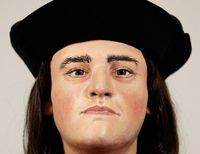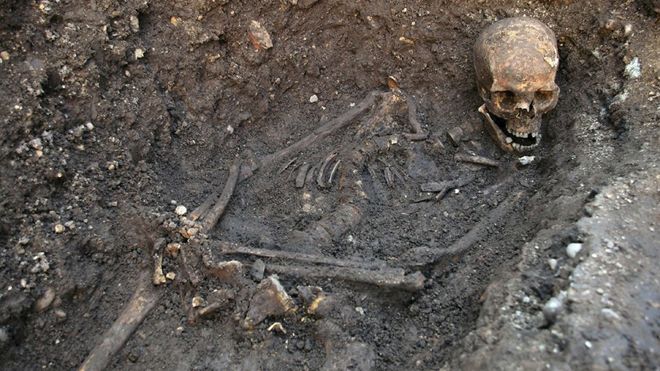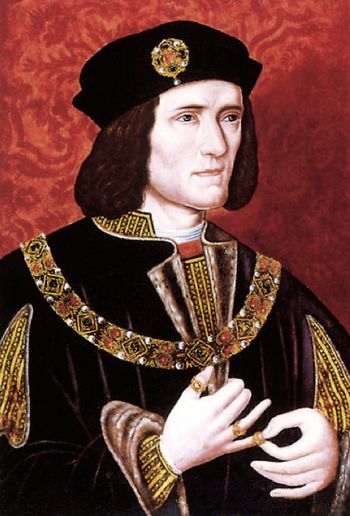It has naught to do with photography I'm afraid, but for history buffs the news of the identification of the mortal remains of the Hunchback King, Richard III, has been positively electrifying. The skeleton found under a parking lot (English translation: car park) in Leicester (pronunciation: Lester) last September has stood up to mitochondrial DNA testing when matched against known descendants of the King's sister Anne. The unmarked grave was at the site of Greyfriars, a medieval Franciscan monastery demolished in the 1530s.
Although King of England for only two years, the last of the Plantagenets left an outsized imprint on history. Not only is he the subject of the Shakespeare play, but he is implicated in one of the great murder mysteries in Western history, the suspicious disappearance of the 12- and 9-year-old sons of Edward IV from the Tower of London sometime around 1483. That dark tale is probably known to most English schoolchildren, but might be news to many English speakers in the former colonies and beyond.
Also credited to Richard III are some famous lines, including "A horse! My kingdom for a horse!" (cried out after he'd lost his horse from beneath him at Bosworth Field) and "Off with his head!", the latter probably put into his mouth by the Bard of Avon (and made more famous, of course, by the Reverend Dodgson's Queen of Hearts).
The legend of the Princes in the Tower is a cracking good story, tragedy at its pathetic best. If you don't know it, I've got a book for you—a 1992 publication called (logically enough) The Princes in the Tower, by Alison Weir. A splendid book of popular history, and (at least if you don't already know the story) a page-turner.
Richard III (inset, below: forensic recreation from
the recently discovered skull)
Richard III ended up as the last of the ancient Plantagenet monarchs. Defeated at Bosworth by Henry Tudor, he was the last English King to die in battle, furtively laid to rest by pious friars who feared retribution from his enemies.
 To the victor belongs the telling of history, and it's widely believed that at least some of Richard's reputation as one of England's greatest villains was assigned to him vindictively by his Tudor conquerors. (And remember that Shakespeare himself was the subject of a Tudor queen, the politically adroit Elizabeth I.) There is plentiful evidence that Richard—like another supposed tyrant before him, Julius Caesar—was at heart a liberal reformer, another sin which the bloody-minded are hard put to forgive. A novel centered around this revisionist view is The Daughter of Time
To the victor belongs the telling of history, and it's widely believed that at least some of Richard's reputation as one of England's greatest villains was assigned to him vindictively by his Tudor conquerors. (And remember that Shakespeare himself was the subject of a Tudor queen, the politically adroit Elizabeth I.) There is plentiful evidence that Richard—like another supposed tyrant before him, Julius Caesar—was at heart a liberal reformer, another sin which the bloody-minded are hard put to forgive. A novel centered around this revisionist view is The Daughter of Time
by the renowned crime writer Josephine Tey, which I've not read. The famous Laurence Olivier movie is due out on DVD from the Criterion Collection in April, and is already available for streaming on Amazon and Hulu Plus.
A number of years ago I put together a list called "The 225 Books," meant as a cultural curriculum of self-education for high school students*. The Princes in the Tower made my cut then. It hasn't found universal approval from passionate fans and apologists of the Hunchback King, of whom there are many, but it tells the most likely tale. I found it a first-class read.
Now would be an appropriate time to acquaint (or re-acquaint) with it, along with Shakespeare's play. In fact, I think I will.
Mike
*But consisting of books that are pleasurable and easy to read, as opposed to being punishingly dull, archaic, or weighty.
Original contents copyright 2013 by Michael C. Johnston and/or the bylined author. All Rights Reserved. Links in this post may be to our affiliates; sales through affiliate links may benefit this site.
(To see all the comments, click on the "Comments" link below.)
Featured Comments from:
Ed: "I do hope that this doesn't turn out to be another 'cold fusion' where academics were so keen to get publicity that they didn't do all their due diligence. It might just as plausibly be a monk who had a bad back. The DNA evidence is not really all that strong and so they have used it as support for other factors like location, age and spinal deformity."
Mike replies: I agree, it does have a whiff of that "too good to be true" air about it. And under the "follow the money" principle, note the sponsors of the archaeology. I don't know anything about it beyond "what I've read in the papers," so to speak, but I'll keep a thimbleful of skepticism in reserve just the same.
Anders: "Josephine Tey's Richard III book, The Daughter of Time, was voted greatest mystery novel of all time by the Crime Writers' Association in 1990. The few books she gave us are all delightful."
Jed Wormhoudt: "The Daughter of Time is worth reading. If Josephine Tey's argument is not wholly persuasive, it is certainly charming. As are Ms. Tey's other two novels, A Shilling for Candles, and my favorite, Brat Farrar.
"While the Olivier version of Richard is very fine, the Ian McKellen is much more amusing. The famous opening speech—'Now is the winter of our discontent...'—is brilliant, and very different from the traditional nasty inward version. McKellan starts it as a celebratory political speech and ends it in front of a urinal. Robert Downey Jr and Kristin Scott Thomas add to the fun. A Netflix must."
Bruno Masset: "Now is this winter of our disinterment / Made spurious fodder by this piece of blog...."




